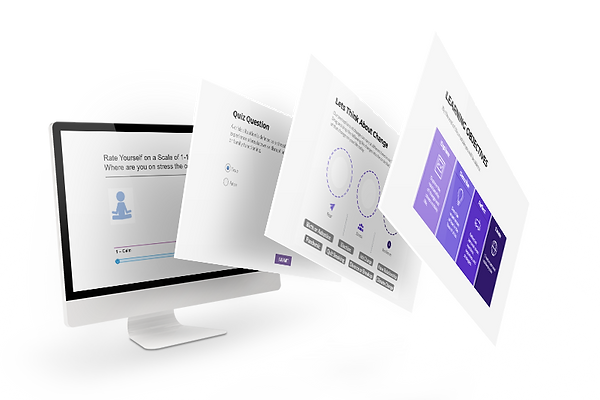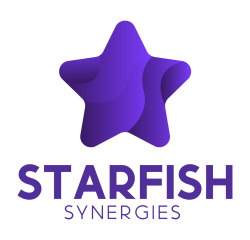Project Overview
Why This Course
This course content is part of a 3 part module series presented by researcher Theresa Bailey of Starfish Synergies. It is designed to help employees explore their own reactions to stress produced by change while demonstrating positive techniques and practices.
Specifications and final deliverables:
-
a SCORM course trackable in the client's LMS
-
mobile friendly and responsive on all devices
-
use of interactive gamification for increased user engagement
-
personal reflection activities
-
journaling activities through included workbook
-
testing to prove learner's knowledge


Business Objectives
The business objectives identified include:
-
reduce stress related employee time off
-
reduce budget for employee sick leave
-
increasing employee's sense of safety and well being across organization
Performance KPIs
The key performance indicators used to measure the success of this course include:
-
reduce budget for in-person training time by 20%
-
prove successful use of techniques through graded activities
-
prove understanding of learning objectives through passed exam

Strategic Approach
Target Audience
The learner profile for this course comprised of:
-
average age range 25-45 years old
-
team leads and management level
-
both male and female learners
-
technologically-friendly
-
primarily English first language
-
located in various regions across Canada
-
learning on multiple devices and settings
(not all in-office)


Learning Outcomes
The learning outcomes identified include:
-
understanding company HR standards
-
knowing procedures and how to report
-
being able to locate company policies and procedures and apply ethical responsibility
Strategy Applied
The techniques used to facilitate these required objectives and outcomes include:
-
rich multimedia experience (images, video, and narration)
-
use of interactive gamification to test user knowledge
-
a structured learning plan using micro learning modules to keep users engaged
-
a fillable workbook designed as a supplementary follow-along resource

Design Choices
Company Branding
The course was designed according to existing company branding to include:
-
use of company colours
-
logo (not pictured here for confidentiality)
-
tone in content developed
-
primary and secondary font pairings
The client provided their brand standards for review before design work began and provided approved content that was inline with their company standards.


Gamification
One of the identified deliverables was to engage learners with interactive elements that allowed for self reflection. To accomplish this, I included a baseline self assessment, drag and drop interactions and sliding scales which allowed the learners to explore their own strengths and weaknesses while exploring new techniques to cope with change.
Software Used
This course was developed in Articulate Storyline 360 and delivered as a packaged SCORM file for implementation on the client's existing LMS.

Development Process
Storyboarding / Sequencing
These are the first steps for development used in building this course:
-
collection of content (including provided visuals and brand standards)
-
sourcing of stock images and video
-
sequencing the content into a storyline
-
approval of outline
-
building a prototype for initial review and feedback


Prototype
Once initial approvals are made, I put all the pieces together and build a prototype of the course.
At this stage, I completed a first draft of the course with functional interactivity, visuals, and narration.
The client tested the course using the review and feedback function within Articulate 360 so they could leave comments directly on-screen.
Implementation / Testing
Once initial approvals are made, I put all the pieces together and build a prototype of the course.
-
revise requested changes
-
final approval
-
implementation on system
-
small batch user testing
-
feedback and final adjustments

Key Takeaways
What We Learned
During this course development we appreciated the time spent in creating our instructional design plan.
When working with a passionate presenter and subject matter expert communication is paramount. As we worked with Theresa to transform her face-to-face workshop into a quality online learning experience it became our roadmap and guided the development process.
This project highlighted the importance of partnership in learning and development and how much fun it can be to combine passion, technology and design.

Client Success
The key performance indicators for this project were all met or surpassed.
-
recreate the face-to-face workshop experience with a quality interactive online learning experience
-
reduce companies budgets for in-person training time by 20%
-
provided a contact method for continued coaching opportunities
-
provided a revenue stream through sale of online courses




